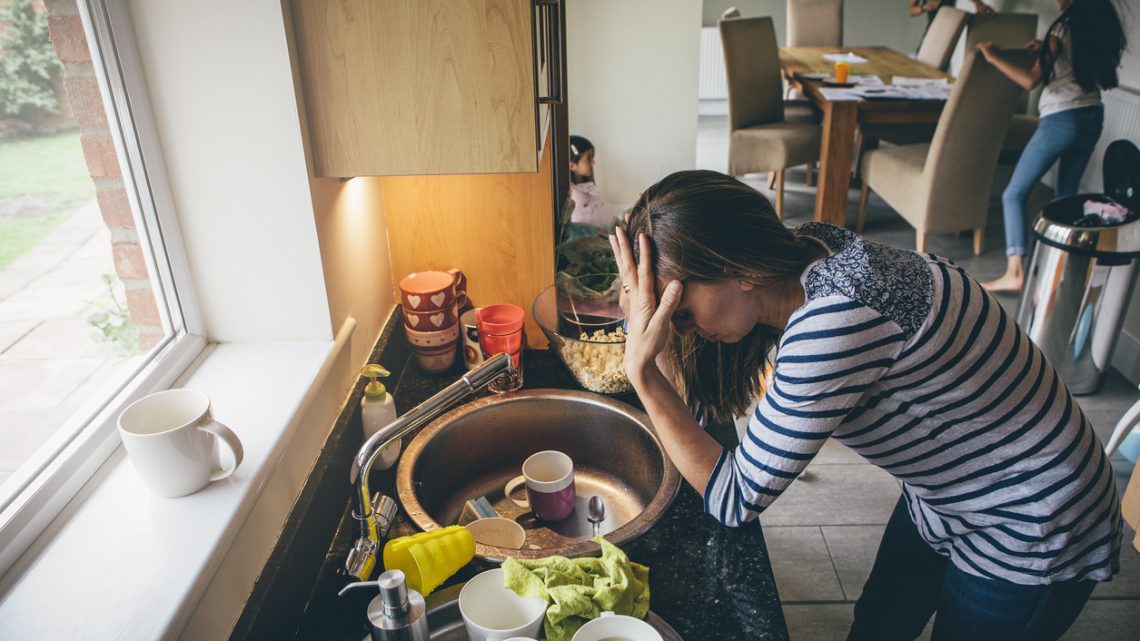The day I realized something was wrong with me was the day I stopped being powerless against it. I have the perfect husband, three beautiful boys, and am finally settling into my dream job after years of only fanaticizing about it. I was happy.
But one day I began to notice that sometimes I’d wake up on “the wrong side of the bed.” The air in my house would feel heavy, weighing on me like water that I couldn’t breathe. When my kids wanted hugs, my skin crawled, and when I looked around my house I shuddered under a mountain of work, under the have-nots and what-ifs. I’d go to sleep just fine one day and wake up the next with a darkness enveloping me like a too-tight, too-hot blanket.
Pretty soon other people started noticing it too. My husband began buffering for me. He’d tell the kids “Mommy needs space” when he saw my eyes brim with tears. He’d pull me into a hug when he saw my gaze grow distant, my mouth go quiet, my joy disappear. It would happen overnight, and he noticed that too.
I felt guilty that for a few days every month I hated my life. I couldn’t stand sound; I couldn’t stand to be touched; I couldn’t stand to be comforted. I felt guilty about this secret that I held inside. My bright personality had a dark spot that I couldn’t fight. Something was wrong with me, and that filled me with guilt as well. I’m a young woman with young children. I want to be healthy for them. My family deserves a healthy, happy mama.
Naming the demon
Eventually I began to research this crazy roller coaster that had taken hold of my life and threatened my joy. Through internet searches, online groups, and the Gia Allemand Foundation, I decided to track my symptoms. After three months, I had an answer: Premenstrual Dysphoric Disorder. PMDD. And just like that, my demon had a name.
You’ve heard of PMS. Every kid that takes seventh grade health has heard of PMS. It’s been the object of juvenile jests for years. When a girl has a couple of bad days, her peers–boys and girls alike–attribute it to PMS. When a woman gets overwhelmed in the workplace or loses her wits in the elementary school pick-up line, it’s attributed to PMS. It’s a common excuse for belly-aches, skin blemishes, and behavioral mood swings once a month. As much as people discuss PMS, not many people know it stands for Premenstrual Syndrome. It’s an ailment, a condition, a syndrome. Not something to be slurred, or a label to be ashamed of.
While PMS and PMDD are often confused, downplayed, and laughed at, PMDD is classified as a mental illness in the Diagnostic and Statistical Manual of Mental Disorders, 5th Edition. It is categorized as a depressive disorder which includes the presence of sad, empty, or irritable mood, and cognitive changes that affect the individual’s capacity to function. According to the Gia Allemand Foundation, 15 percent of women with PMDD will commit an act of suicide in their lifetime and still more will experience thoughts of suicide and self-harm. I know of women who have lost their families and jobs because of this illness, and Gia Allemand, American actress and model, lost her life because of it.
Choosing light
There are 5 million women in the U.S. with PMDD, and even more men and women who suffer from depression in general. Despite these high numbers, it’s still not talked about. It’s still not okay to say you’re not okay. If I tell my mom, my sister, or my pastor I’m depressed, they’ll assume I’m unhappy. How would I tell my husband? Won’t he think I don’t love him anymore? How do I tell my kids “Mommy just needs a minute—just, please stop touching me?” Won’t they wonder when it’s okay to love me, when it’s okay to care enough to offer a sloppy, four-year-old kiss and when it isn’t?
As soon as I started talking about my depression, my shoulders got lighter. When I opened the door and let the light in, the darkness was still there, but at least I could see the light. I have a new appreciation for God’s Word. When He told Eve all those years ago, “I will greatly multiply your sorrow and your conception; In pain you shall bring forth children,” I don’t think He only meant labor pains. My mood disorder is directly related to my sexuality as a woman. It’s directly related to the hormones that I share with Eve, and it’s a direct result of sin on this earth just as every other illness is. This world is not my home, and PMDD doesn’t define me because when I go home to live with Jesus, I’ll have a new body—one that doesn’t hate me, and one that I don’t hate.
Just as it’s important to understand yourself and your family, it’s important to be sympathetic to others. In a time and place where 43.8 million individuals in the U.S. experience some form of mental illness in a given year[1], it should not be taboo to speak up about depression. It should not be shameful to mention a friend with schizophrenia. It should not be a whispered threat when so-and-so came home from war with PTSD. This is the world we live in. It’s ugly and it’s sinful, and full of sadness. The only cure is Jesus’ soon coming. That is the light I shine on my darkness.
Oct. 2-8 is mental illness awareness week.
Take the #StigmaFree Pledge: https://www.nami.org/stigmafree/pledge
More information/resources for PMDD: https://giaallemandfoundation.org/
[1] https://www.nami.org/Learn-More/Mental-Health-By-the-Numbers










